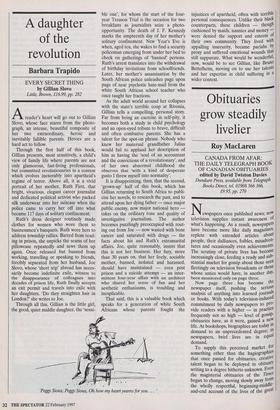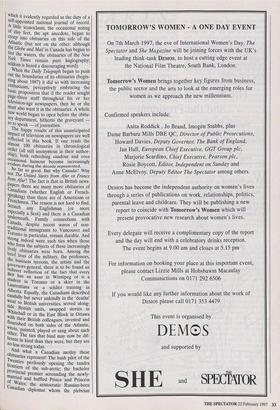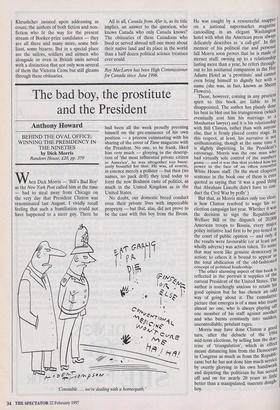Obituaries grow steadily livelier
Roy MacLaren
CANADA FROM AFAR: THE DAILY TELEGRAPH BOOK OF CANADIAN OBITUARIES edited by David Twiston Davies Dundum Press, available from Telegraph Books Direct, teL 01908 566 366, £9.95, pp. 270
WOO
Newspapers once published news; now television supplies instant awareness of what's happening. As a result, newspapers have become more like daily magazines, replete with extended articles about people, their dalliances, foibles, misadven- tures and occasionally even achievements. The scrutiny of private lives has become increasingly close, feeding a ready and sub- stantial market for gossip about those seen fleetingly on television broadcasts or those whose antics would have, in another day, been monitored only on page three. Now page three has become the newspaper itself, pushing the serious analysis of anything into learned journals or books. With today's television-induced commitment by daily newspapers to pro- vide readers with a higher — in practice frequently not so high — level of gossip, obituaries have, as it were, gained a neW life. At bookshops, biographies are today in demand to an unprecedented degree; in newspapers, brief lives are in equal demand.
To supply this perceived market for something other than the hagiographies that once passed for obituaries, creative talent began to be deployed in obituary writing to a degree hitherto unknown. Even the magisterial obituaries of the Times began to change, moving slowly away froth the wholly respectful, beginning-middle- and-end account of the lives of the great which it evidently regarded as the duty of a self-appointed national journal of record. A little iconoclasm, the occasional noting of clay feet, the apt anecdote, began to creep into obituaries on this side of the Atlantic (but not on the other: although the Globe and Mail in Canada has begun to test the waters, the obituaries of the New York Times remain pure hagiography; seldom is heard a discouraging word). When the Daily Telegraph began to push out the boundaries of its obituaries (begin- ning about 1987) it did so with increasing enthusiasm, perceptively embracing the basic proposition that if the reader sought page-three stuff throughout his or her television-age newspaper's, then he or she must also want it in the obituaries. A whole new world began to open before the obitu- ary department, hitherto the graveyard so to speak — of journalists. The happy results of this unanticipated Impact of television on newspapers are well reflected in this book. If one reads the almost 100 obituaries in chronological order (all still anonymous in their author- Shia both refreshing candour and even occasional humour become increasingly evident during the decade represented. So far so good. But why Canada? Why not The United States from Afar or France from Afar? The fact is that in British news- papers there are many more obituaries of Canadians (whether English or French- speaking) than there are of Americans or Frenchmen. The reason is not hard to find. Scratch any Englishman (or more especially a Scot) and there is a Canadian underneath. Family connections with Canada, despite recent waves of non- traditional immigrants to Vancouver and Toronto in particular, remain durable. And strong indeed were such ties when those Who form the subjects of these increasingly lively obituaries were born. Among the brief lives of the military, the professors, the business tycoons, the artists and the governors-general, there is to be found an Indirect reflection of the fact that every Brit has an aunt in Winnipeg or is a student in Toronto or a skier in the Laurentians or a soldier training in Alberta. Equally, the Canadians described candidly but never unkindly in the 'deaths' went to British universities, served along- side British units, swapped stories in Whitehall or in the East Block in Ottawa with their British colleagues, invested and flourished on both sides of the Atlantic, wrote, painted, played or sang about each other. The ties that bind may now be dif- ferent in kind than they were, but they are no less strong today. And what a Canadian motley these obituaries represent! The bush pilot of the Twenties perilously opening the tundra frontiers of the sub-arctic; the bachelor Provincial premier serenading the newly- married and baffled Prince and Princess of Wales; the aristocratic Russian-born Canadian diplomat whom the plebeian Khrushchev insisted upon addressing as count; the authors of both fiction and non- fiction who lit the way for the present stream of Booker-prize candidates — they are all there and many more, some bril- liant, some bizarre. But in a special place are the sailors, soldiers and airmen who alongside or even in British units served with a distinction that not only won several of them the Victoria Cross but still gleams through these obituaries. All in all, Canada from Afar is, as its title implies, an answer to the question, who knows Canada who only Canada knows? The obituaries of these Canadians who lived or served abroad tell one more about their native land and its place in the world than a half dozen political science treatises ever could.
Roy MacLaren has been High Commissioner for Canada since June 1996.




























































 Previous page
Previous page